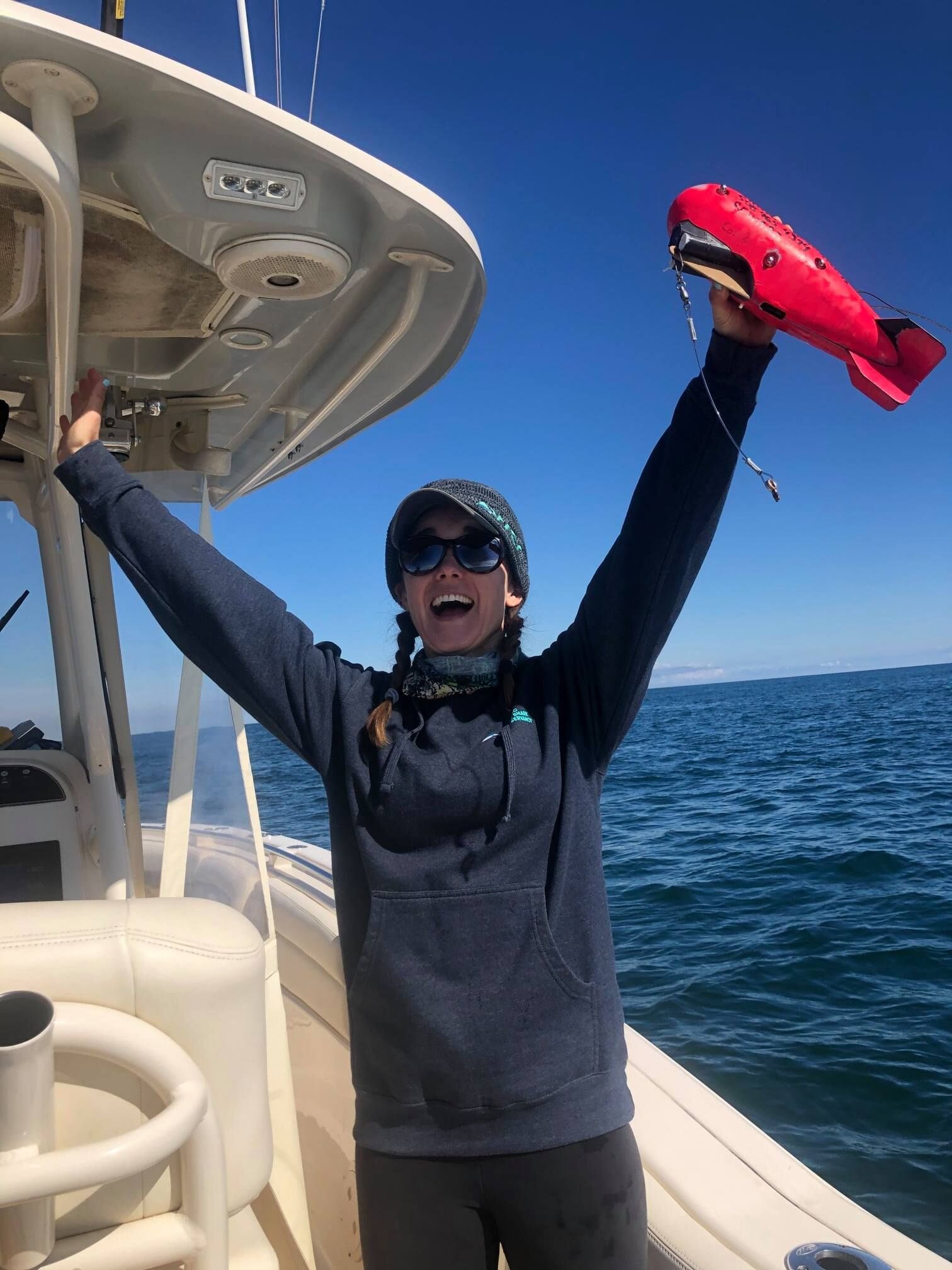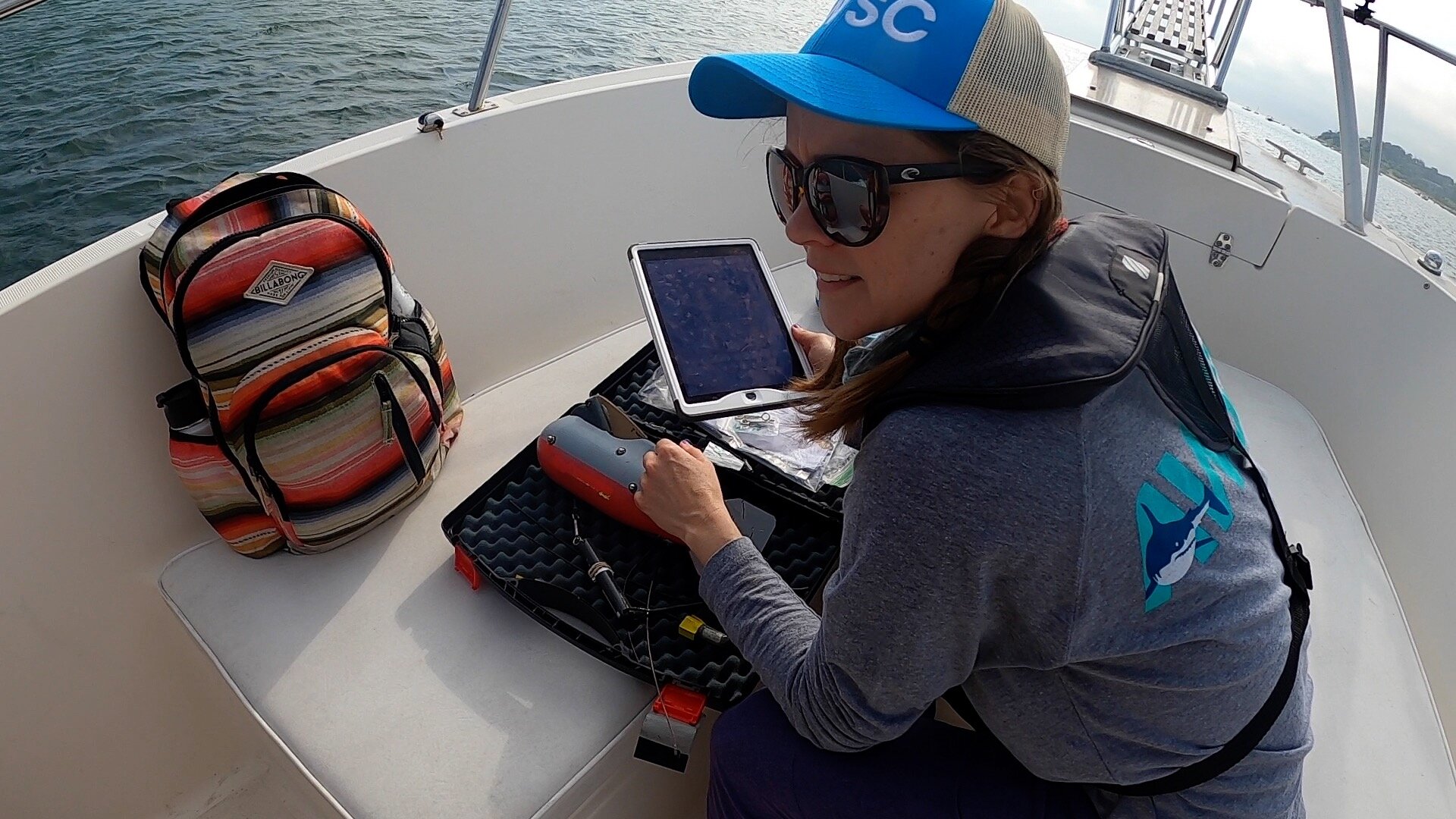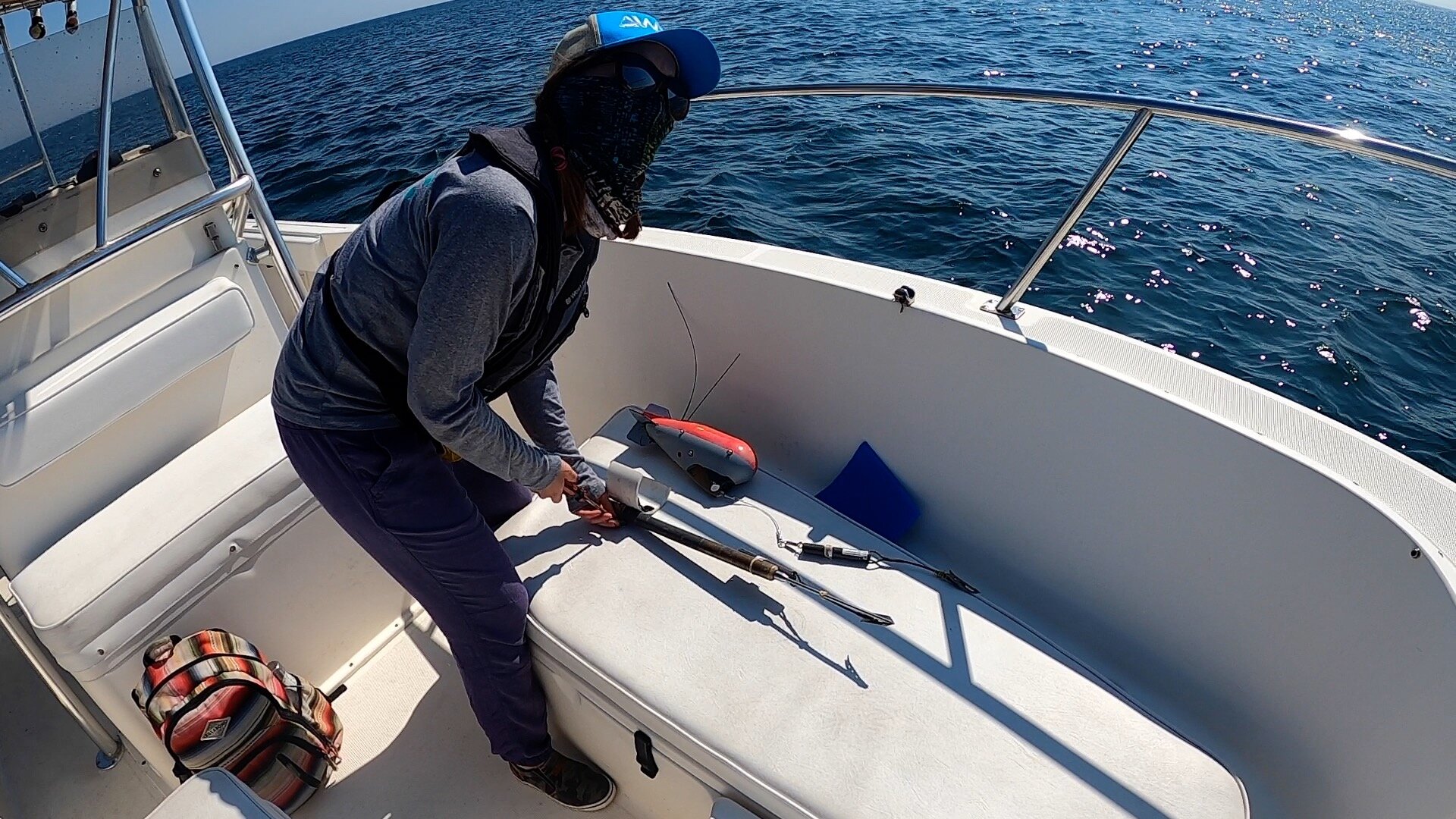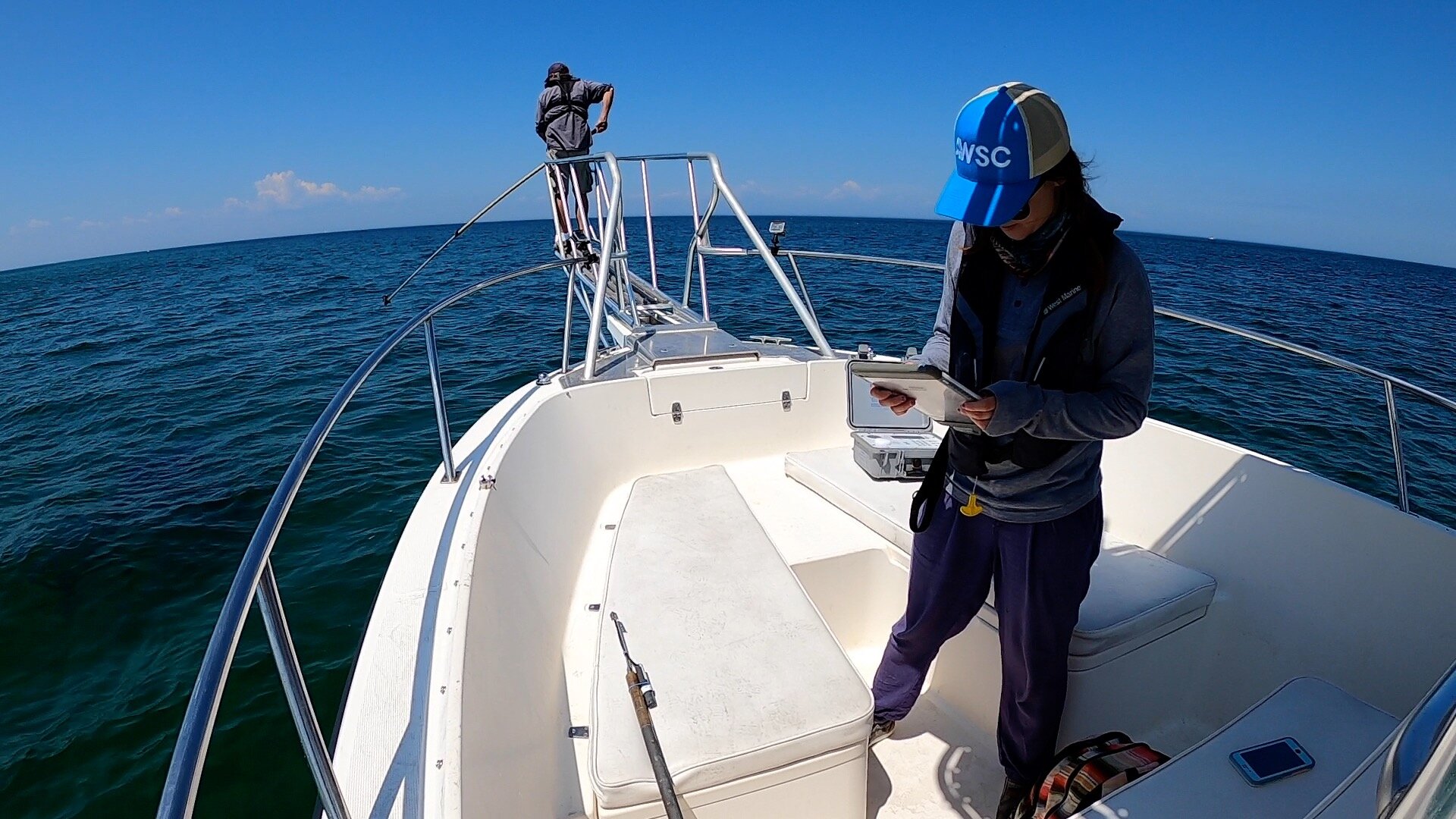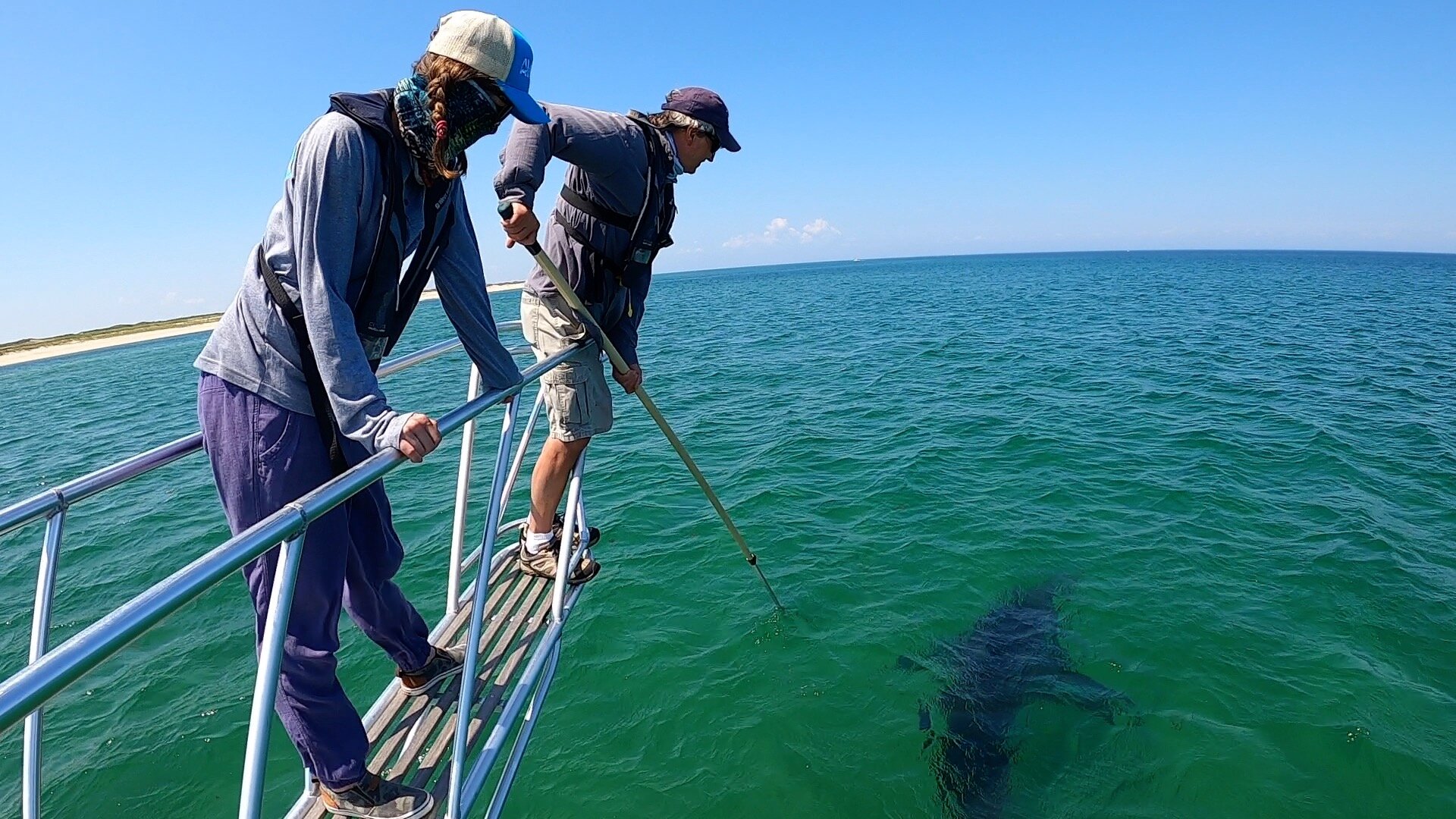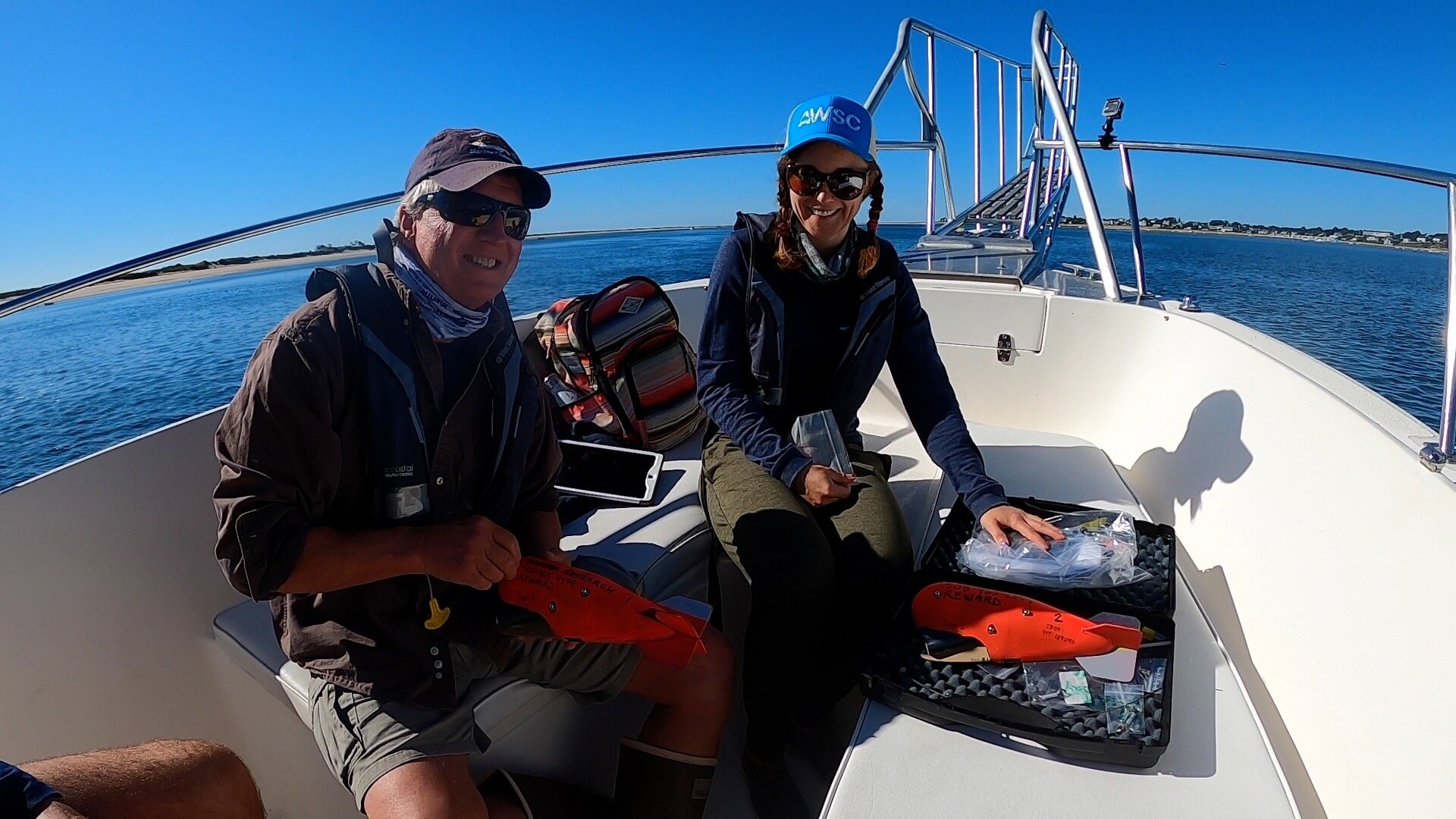Meet megan winton
As a Fisheries Scientist and native Floridian, our Staff Scientist Megan Winton imagined herself scuba diving daily on a tropical island, not on a research vessel off the coast of New England during our chilly fall season. Luckily for us, Megan’s fifteen-year career has ultimately led her to seek a Ph.D. at UMass Dartmouth’s School for Marine Science & Technology and to Cape Cod studying, tracking, and collecting data on white sharks at AWSC. Her interest in sharks is undeniable and inspiring. As a dynamic and whipsmart researcher, Megan’s work has become critical to our understanding of the local shark population.
Megan specializes in quantitative fisheries biology, using statistical analyses to characterize the habitat use and population dynamics of sharks off our local Coast. And while this work typically lends itself to hours in front of computer screens, Megan firmly believes this work is synergetic and always a team effort. On a daily basis, Megan works closely with a squad of other female researchers to identify an extensive catalog of sharks via unique visual characteristics - including gill coloration, dorsal fin notches, coloration of pelvic fins, spots and pigment patterns along tails, and scarring. Megan herself has described this work as meticulous but collaborative, crediting her fellow researchers as an integral part of the identification process.
To collect this catalog, Megan and the team at AWSC tag and track Atlantic white sharks off the coast of Cape Cod. Megan credits the success of this work to the Cape community at large. As any scientist will know, research does not occur single-handed. To successfully pull off a tagging expedition, a wide range of skillsets and equipment are required (be sure to watch our Facebook Live interview with Megan to hear all about her favorite types of equipment to use!).
Megan continues to lead our research efforts, and her hard work and interest in ocean biology have greatly impacted our collective knowledge of Atlantic white sharks. For continued updates on her research, be sure to check back here or sign up for our monthly newsletter.
PEER-REVIEWED PUBLICATIONS
Winton MV, Sulikowski J, Skomal GB (2021) Fine-scale vertical habitat use of white sharks at an emerging aggregation site and implications for public safety. Wildlife Research. https://www.publish.csiro.au/wr/WR20029
Verkamp HJ, Skomal GB, Winton MV, Sulikowski JA (2021) Using reproductive hormone concentrations from the muscle of white sharks (Carcharodon carcharias) to evaluate reproductive status at a coastal aggregation in the Northwest Atlantic Ocean. Endangered Species Research. https://www.int-res.com/abstracts/esr/v44/p231-236/
Natanson LJ, Winton MV, Bowlby H, Joyce W, Deacy B, Coelho R, Rosa D (2020) Updated reproductive parameters for the shortfin mako (Isurus oxyrinchus) in the North Atlantic with inferences of distribution by sex and reproductive stage. Fishery Bulletin 118: 21-36.
Winton MV, Kneebone J, Zemeckis DR, Fay G (2018) A spatial point process model to estimate individual centers of activity from passive acoustic telemetry data. Methods in Ecology and Evolution 9(11): 2262-2272. DOI: https://doi.org/10.1111/2041-210X.13080
Kneebone J, Winton MV, Danylchuk A, Chisholm J, Skomal GB (2018) An assessment of juvenile sand tiger (Carcharias taurus) activity patterns in a seasonal nursery using accelerometer transmitters. Environmental Biology of Fishes 101(12): 1739-1756. DOI: https://doi.org/10.1007/s10641-018-0821-4
Winton MV, Fay G, Haas HL, Arendt M, Barco S, James MC, Sasso C, Smolowitz R (2018) Estimating the distribution and relative density of satellite-tagged loggerhead sea turtles in the western North Atlantic using geostatistical mixed effects models. Marine Ecology Progress Series 586: 217-232. DOI: https://doi.org/10.3354/meps12396
Winton MV, Huntsberger C, Rudders D, DeCelles G, Thompson K, Goetting K, Smolowitz R (2017) Spatiotemporal patterns of flatfish bycatch in two scallop access areas on Georges Bank. Journal of Northwest Atlantic Fishery Science 49: 23–37. DOI: https://doi.org/10.2960/J.v49.m710
Winton MV, Wuenschel MJ, McBride RS (2014) Investigating spatial variation and temperature effects on maturity of female winter flounder (Pseudopleuronectes americanus) using generalized additive models. Canadian Journal of Fisheries and Aquatic Sciences 71(9): 1279-1290. DOI: https://doi.org/10.1139/cjfas-2013-0617
Natanson LJ, Adams DH, Winton MV, Maurer J (2014) Age and growth of the bull shark, Carcharhinus leucas, in the western North Atlantic Ocean. Transactions of the American Fisheries Society 143(3): 732-743. DOI: https://doi.org/10.1080/00028487.2014. 892537
Natanson LJ, Gervelis BJ, Winton MV, Hamady LL, Gulak SJB, Carlson JK (2014) Validated age and growth estimates for Carcharhinus obscurus in the northwestern Atlantic Ocean, with pre- and post-management growth comparisons. Environmental Biology of Fishes 97(8): 881-896. DOI: https://doi.org/10.1007/s10641-013-0189-4
Winton MV, Natanson LJ, Kneebone J, Cailliet GM, Ebert DA (2014) Life history of Bathyraja trachura from the eastern Bering Sea, with evidence of latitudinal variation in a deepsea skate species. Journal of the Marine Biological Association of the United Kingdom 94(2): 411-422. DOI: https://doi.org/10.1017/S0025315413001525
Barnett LAK, Winton MV, Ainsley SM, Ebert DA, Cailliet GM (2013) Comparative demography of skates: life-history correlates of productivity and implications for management. PLoS ONE 8(5): e65000. DOI: https://doi.org/10.1371/journal.pone.0065000
Book Chapters
Winton MV, Ebert DA. In press. Carcharhinidae. In: Heemstra PC, Randall JE (eds.) Fishes of the Western Indian Ocean.
Ebert DA, Winton MV (2010) Chondrichthyans of high latitude seas. Chapter 3 In: Carrier JC, Musick JA, Heithaus MR (eds.) Sharks and their relatives II: biodiversity, adaptive physiology and conservation, pp. 115-158. Boca Raton, FL: CRC Press LLC.
“Research on Cape Cod is a community effort.”
Advice to Young Shark Scientists
Read as much as you can and explore what interests you specifically about sharks.
Volunteer. Lending a hand at local nonprofit organizations is a great way to expose yourself to the industry.
Be interested! Reach out to scientists whose work sparks a curiosity. Scientists love talking about their work - they just may take a few weeks to actually return your email.
Focus on math and statistics courses while in school. According to Megan, her knowledge of statistics makes her a better biologist.
Cultivate stubbornness and a willingness to fail. Being a scientist is hard but creative work. Ask questions and don’t be afraid to be wrong.
Remember: this is not a linear path. There will be twists and turns and unexpected detours in your career path - enjoy and grow with each experience and opportunity.


